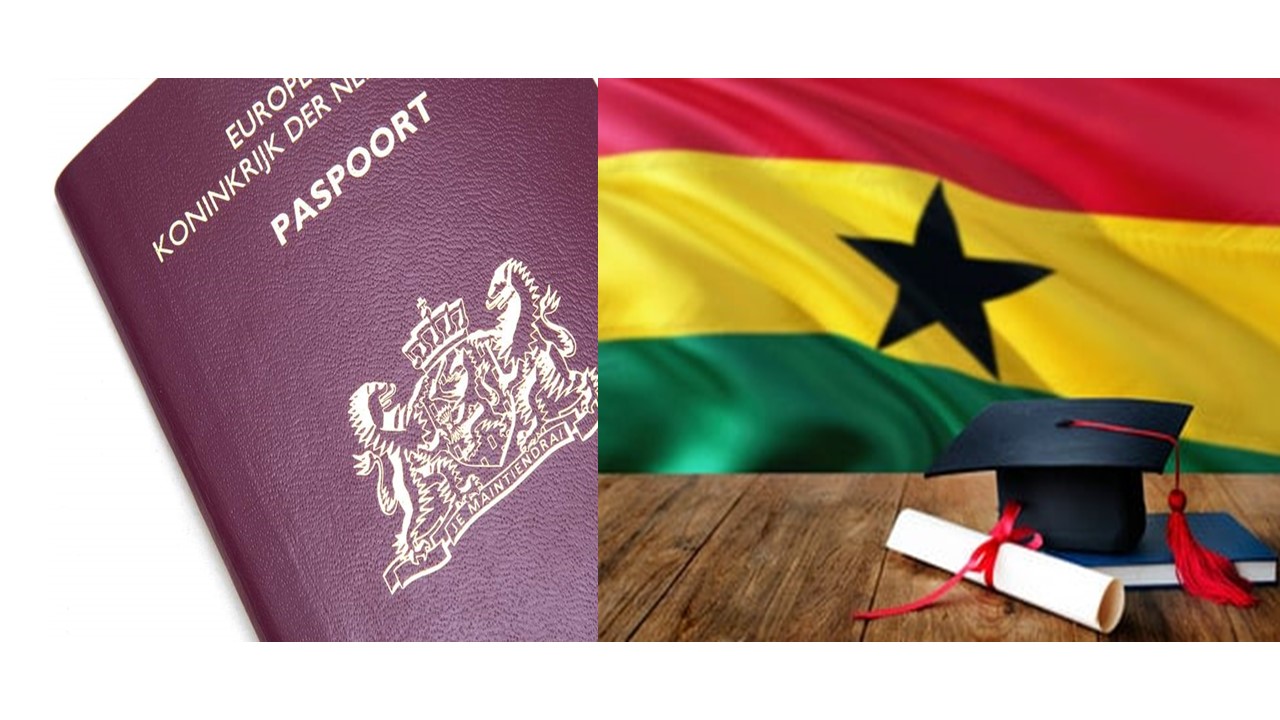- by rebecca
- March 30, 2024
Click the link below to join Our WhatsApp group for daily brief on current trends in the country.
Join Here!
Loading

In recent months, a debate has made the rounds through the social, academic, and political circles of Ghana: is holding a Dutch passport more advantageous than earning a PhD?
The raging debate was sparked by self-patronizing comments captured in a viral video of a supposed Ghanaian known as ‘Kofigabs’ claiming to be living in the Netherlands.
He also claimed to be a janitor and lived in the country for 10 years qualifying him to become a citizen.
In his assertion, his toil over the years as an uneducated person cleaning lavatories has eventually paid off with the acquisition of the Dutch passport, which he believes is better and more prestigious than a PhD qualification attained from the University of Ghana.
The supporting argument from “Kofigabs” as a holder of a Dutch passport, is that he can travel to many countries without applying for Visas and would also be given preferential treatment unlike, a PhD holder from Ghana who will have to go through scrutiny to apply for visas with their Ghana Passports despite their academic achievements.
For many Ghanaians, the allure of a foreign passport, particularly from a country like the Netherlands, represents more than just a travel document. It symbolizes a gateway to opportunities, stability, and a potentially higher quality of life. This sentiment is driven by several factors:
The Dutch economy offers more diverse and potentially lucrative job opportunities compared to the often saturated and underpaid job market in Ghana. Despite holding advanced degrees, many PhD holders in Ghana struggle with unemployment or underemployment.
With a Dutch passport, many Ghanaians believe they can access better healthcare, education, and social services. The Netherlands is known for its high standard of living, comprehensive welfare system, and progressive social policies, which are significant draws for individuals seeking better living conditions for themselves and their families.
Although Ghana has reputable universities, the infrastructure and resources available for research and development are often limited. In contrast, the Netherlands has some of the world’s leading research institutions, offering state-of-the-art facilities and extensive funding for academic pursuits.
On the other side of the debate, proponents of higher education argue that a PhD holds intrinsic and long-term value that transcends immediate economic benefits.
A University of Ghana professor, Dr Kobby Mensah, contends that people opting for the Dutch passport do not know what a PhD is.

Additionally, he noted that people opting for the Dutch passport do not have deep intellectual engagement.
“Why would someone who still has resit after 5 years, and now waiting for Amnesty to redeem himself opt for PhD in this debate,” he questioned.
Earning a PhD represents a significant achievement in one’s academic and professional journey. It signifies deep expertise in a specific field, contributing to personal growth and intellectual development.
PhD holders play a crucial role in national development. Their research can address local challenges, innovate solutions, and contribute to policy-making processes that drive progress in various sectors, from healthcare to technology.
Education is highly valued in Ghanaian culture. PhD holders often serve as role models and mentors, inspiring younger generations to pursue academic excellence and contributing to a culture of intellectual curiosity and advancement.
The debate is not just theoretical; it is rooted in real-life experiences and choices of individuals. Take the case of Dr. Kwame Asante, a Ghanaian with a PhD in Agricultural Science.
Despite his qualifications, Dr. Asante faced numerous challenges in securing funding for his research and struggled with inadequate facilities. When he received an offer to work at a research institute in the Netherlands, the decision was bittersweet.
“Leaving Ghana was difficult, but the opportunities in the Netherlands allowed me to advance my research and contribute in ways that were not possible back home,” he explains.
Ama Boateng, a Dutch passport holder, returned to Ghana after years of living abroad. She emphasizes that while the passport offered her many opportunities, her heart remained in Ghana.
“I wanted to make a difference here. The skills and experiences I gained abroad are valuable, but there’s a unique satisfaction in contributing directly to my country’s development,” she says.
The debate highlights significant policy implications for Ghana. To retain talent and prevent brain drain, there is a pressing need for the government and private sector to invest more in research, provide better employment opportunities, and improve living conditions. Additionally, fostering international collaborations can provide local scholars with the exposure and resources they need while allowing them to contribute to global knowledge from their home country.
Whether one values a Dutch passport or a PhD more depends on individual circumstances, aspirations, and experiences. However, the ongoing debate underscores the broader socio-economic challenges faced by Ghanaians and the critical importance of creating an environment where both academic excellence and quality of life are achievable within the country’s borders. As Ghana continues to develop, striking a balance between these priorities will be essential for the nation’s future.

Click the link below to join Our WhatsApp group for daily brief on current trends in the country.
Join Here!
0 Comments: